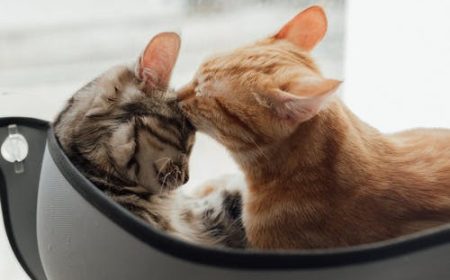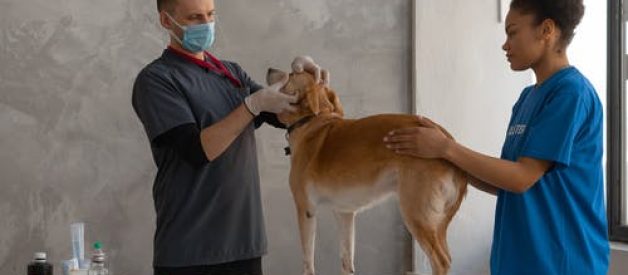Kittens aren’t just a ball of furry fun; owning one entails responsibility for their health and well-being. Part of this responsibility involves making sure they receive the necessary vaccinations to keep them healthy and vital. In this article, we’ll provide guidance and suggestions about the ideal timescale of vaccinations for your new feline friend.
Why Are Vaccinations Necessary for Your Kitten?
Cat vaccinations are indeed essential for the health and well-being of kittens. They play a critical role in safeguarding them from several potentially life-threatening diseases. Here’s why vaccinations are necessary for your kitten:
- Disease Prevention: Vaccinations protect kittens from infectious diseases, including feline panleukopenia, feline viral rhinotracheitis, and feline calicivirus. These diseases can be highly contagious and pose serious health risks to unvaccinated kittens, often leading to severe illness or even death.
- Boosting Immunity: Vaccines stimulate the immune system to recognize and combat specific disease-causing agents and pathogens. By introducing harmless forms of these pathogens, vaccines prepare the immune system to respond rapidly and effectively if the kitten is exposed to the actual disease in the future.
- Preventing Transmission: Vaccinations not only protect individual kittens but also help prevent the spread of infectious diseases within the feline population. This concept of “herd immunity” is crucial, particularly in multi-cat households or communities where cats frequently interact with one another.
- Long-Term Health Benefits: By ensuring your kitten receives the appropriate vaccinations at the recommended times, you set them up for a healthier life, minimizing the risk of contracting preventable diseases and reducing the likelihood of costly medical treatments associated with these illnesses.
It is essential to consult a veterinarian to develop a tailored vaccination schedule for your kitten, considering their age, health status, and environmental factors. By staying proactive with vaccinations, you provide your kitten with the best possible protection against common feline diseases and contribute to their long-term health and well-being.
When Should You Discuss Vaccination Plans?
It’s crucial to discuss vaccination plans for your kitten at the earliest opportunity to ensure they receive timely and appropriate protection against common infectious diseases. Here’s a breakdown of when to discuss and initiate vaccination plans for your kitten:
- Pre-Adoption Discussion: Before bringing your kitten home, it’s beneficial to have a preliminary discussion with a veterinarian or animal healthcare provider. They can provide valuable information about the necessary vaccinations, the recommended schedule, and any specific considerations based on your kitten’s breed, health history, and living environment.
- Initial Vaccination Timing: Kittens typically receive their first vaccinations at around eight weeks. These initial vaccinations often include those for diseases such as feline panleukopenia, feline viral rhinotracheitis, and feline calicivirus. Discussing this initial vaccination plan with your veterinarian early helps ensure your kitten receives the necessary protection at the appropriate time.
- Subsequent Vaccinations: Following the initial vaccination, your veterinarian will recommend a schedule for subsequent vaccinations, usually administered every three to four weeks until the kitten is around 16 to 20 weeks old. These additional vaccinations help reinforce the kitten’s immune response and provide comprehensive protection against a broader range of infectious diseases.
Regular discussions with your veterinarian regarding your kitten’s vaccination plan ensure they receive the necessary immunizations at the right time. These discussions also provide an opportunity to address questions or concerns about your kitten’s health and well-being. By staying proactive and informed, you can help safeguard your kitten’s long-term health and quality of life.
What Vaccinations Should Your Kitten Be Given?
- Feline Leukemia (FeLV): First vaccination at eight weeks and a booster shot three to four weeks later.
- Panleukopenia, Rhinotracheitis, and Calicivirus: These are usually grouped, and the initial dosage is administered at six to eight weeks, followed by a booster shot every three to four weeks until your kitten reaches 16 weeks.
- Rabies: This vaccination is typically given at around 12 weeks.
Remember, your vet is the best person to guide you through the specifics of your kitten’s breed and unique requirements.
Keeping Up With Follow-Up Vaccinations
Maintaining a consistent schedule for booster vaccinations is essential for ensuring that your kitten remains effectively protected against infectious diseases throughout their life. Here’s what you need to know about keeping up with follow-up vaccinations for your kitten:
- Understanding Booster Requirements: After completing the initial series of vaccinations, your veterinarian will advise you on the specific booster requirements for your kitten. Some vaccines may necessitate annual boosters to maintain adequate immunity, while others, such as certain core vaccines, may only require boosters every three years.
- Tailoring to Your Kitten’s Lifestyle: The frequency of booster vaccinations may be influenced by your kitten’s lifestyle, environmental exposure, and any potential risks associated with their daily activities. For instance, if your kitten spends time outdoors or interacts closely with other cats, your veterinarian might recommend more frequent booster vaccinations to ensure continued protection against common infectious diseases.
- Regular Veterinary Check-Ups: Regular visits to the veterinarian are crucial for assessing your kitten’s overall health and determining the necessity of booster vaccinations. During these check-ups, your veterinarian will evaluate your kitten’s vaccination history, assess potential risks, and recommend an appropriate vaccination schedule tailored to your kitten’s needs.
- Staying Informed: Keep yourself informed about the latest recommendations regarding cat booster vaccinations. Guidelines for vaccination schedules may occasionally be updated based on new research and developments in veterinary medicine. Remaining informed about these changes will help you make well-informed decisions regarding your kitten’s ongoing vaccination needs.
The Role of a Compassionate Animal Hospital
To secure the health of your kitten, you’ll need the support of a reliable and compassionate animal hospital. Establishing a good rapport with an animal healthcare provider makes all the difference in your pet’s experience of care and treatments. Establishments such as a Brookhaven vet work seamlessly to provide not just medical aid but also nurturing care, guaranteeing your kitten feels as comfortable and reassuring as possible. Dedicated attention from such professionals assures that your kitten’s vaccination schedule is executed optimally.
How About Boarding for Pets?
Undoubtedly, you love spending time with your furred companion, but inevitably, there may come a time when you need alternative accommodation for your pet. This could be due to travel, renovation work at home, or any other unexpected events. In such instances, options like dog boarding in Brookhaven, MS, are a feasible solution where your pet can enjoy a secure, comfortable, and caring environment.
Conclusion
To ensure your kitten remains healthy, maintaining a suitable vaccination schedule is a must. Starting from the very moment you decide to own a kitten, it’s advisable to consult with your vet about creating a personalized vaccination plan. Remember, it’s not just about giving shots at the right time, but also about how your kitten adjusts to them and monitoring their health condition continuously.










